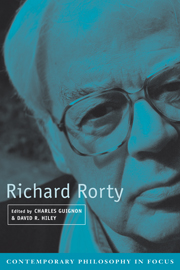Book contents
- Frontmatter
- Contents
- Contributors
- Acknowledgments
- Abbreviations
- Richard Rorty
- 1 Introduction: Richard Rorty and Contemporary Philosophy
- 2 Rorty's Critique of Epistemology
- 3 Rorty on Knowledge and Truth
- 4 From Realism or Antirealism to Science as Solidarity
- 5 Rorty's Democratic Hermeneutics
- 6 Rorty's Inspirational Liberalism
- 7 Don't Be Cruel: Reflections on Rortyan Liberalism
- 8 Rorty and Philosophy
- Bibliography
- Index
6 - Rorty's Inspirational Liberalism
Published online by Cambridge University Press: 18 December 2009
- Frontmatter
- Contents
- Contributors
- Acknowledgments
- Abbreviations
- Richard Rorty
- 1 Introduction: Richard Rorty and Contemporary Philosophy
- 2 Rorty's Critique of Epistemology
- 3 Rorty on Knowledge and Truth
- 4 From Realism or Antirealism to Science as Solidarity
- 5 Rorty's Democratic Hermeneutics
- 6 Rorty's Inspirational Liberalism
- 7 Don't Be Cruel: Reflections on Rortyan Liberalism
- 8 Rorty and Philosophy
- Bibliography
- Index
Summary
In his recent writings, Richard Rorty has interspersed autobiographical reflections in order to situate himself and explain where he is “coming from.” If we want to grasp how Rorty thinks about liberalism, his patriotic identification with the democratic aspirations of America, and his projection of liberal utopia, then it is essential to understand his life experiences and the narrative that he tells about the vicissitudes of Leftist thought in America. In Achieving Our Country, Rorty pauses to explain what it was like to be “a red diaper anticommunist baby” and to become a “teenage Cold War liberal.” His parents were loyal fellow travelers of the Communist Party until 1932 (the year after Rorty was born). They broke sharply with the party when they realized the extent to which it was directed by Moscow. But Rorty's parents (and many relatives and friends) always thought of themselves as Left intellectuals who were associated with a variety of anticommunist socialist and radical democratic causes. So Rorty grew up in a political atmosphere in which there was a great concern with social justice. Most of the people who wrote for Leftist journals at the time (many of whom visited his home) “had no doubt that America was a great, noble, and progressive country in which justice would eventually triumph. By ‘justice’ they all meant pretty much the same thing – decent wages and working conditions, and the end of racial prejudice” (AOC 59).
- Type
- Chapter
- Information
- Richard Rorty , pp. 124 - 138Publisher: Cambridge University PressPrint publication year: 2003
- 13
- Cited by

